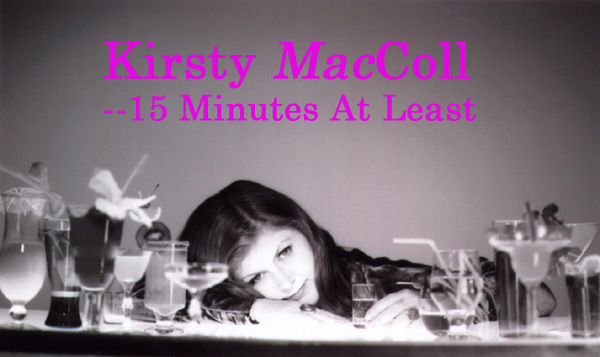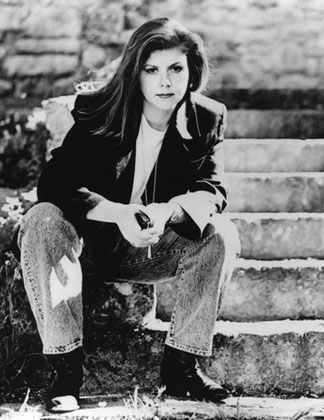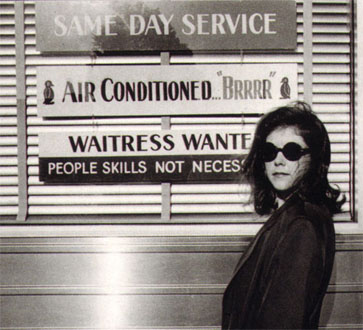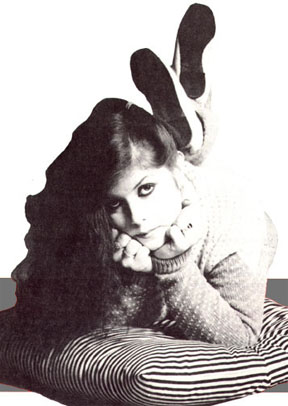
Kirsty MacColl was killed in a boating accident in Mexico on December 18, 2000. That was the gist of the article in the New York Times On-line a couple of weeks ago, the headline stuck down with Culture Notes and obituaries for people I've never heard of. The footnote status for deceased philanthropists never bothered me, but when it was applied to one of my favorite singers on the same page that the ramifications of John Lennon's murder twenty years ago were being endlessly considered, well, it rankled. I know MacColl wasn't as important in any practical sense as Lennon, but she had rare and valuable talent, and I want people to miss her.
For her 1995 compilation Galore, Kirsty MacColl had her friends and fans in the business-including Bono, David Byrne, Chris Frantz & Tina Weymouth, Johnny Marr, Morrissy, and Billy Bragg-write liner notes praising her talent and bemoaning her obscurity. "Why isn't she massively successful?" wondered Shane MacGowan, to whom she sang "you liar you maggot," and, "Merry Christmas my ass I pray God it's our last" on The Pogues dyspeptic "Fairytale of New York." It's a fair question. Though she had lifelong stage fright and rarely toured, she was in demand as a singer on albums by most of the above, plus Robert Plant, the Happy Mondays, Alison Moyet, the Rolling Stones, and Simple Minds. But unquestionably, her best songs were the ones she wrote herself.
Kirsty MacColl wrote songs like George Bernard Shaw wrote plays-witty and candid, having a keen awareness of the sadness of life coupled with an aversion to wallowing in it, and an eye for telling detail.
Another
time, another day/ Another baby on the way
A dreamboy for your nightmare nights
Who never shouts and never fights
Happy with your 2.2/ What else is there for you to do
But turn and wet the baby's head
And pray he will be happier than you or me?
That's how it's meant to be/ It's called a lifetime
That's the beginning of "Tread Lightly," and the sound of a woman giving up on her future is remarkably stolid and fleet. MacColl may write about desperate characters (in fact, Desperate Character was the title of her 1981 British lp), but she is never one to mope. "I never knew just what to feel or to expect/ I tried to stretch my mind but I just get my body wrecked," is presented as a statement of fact rather than a lament; and the emphasis she places on wrecked, starting with a slight growl on the "r," she owns her predicament, takes responsibility for it. She realizes people are created by their choices, good and bad, and she wishes they would wise up even if "it would take a gunshot just to clear your head a while."
MacColl has a knack for pithily assessing a person or situation, as in:
She
was a party girl, stayed up till the small hours
Now she's embarrassing and everybody laughs
At the girl with the face that could drive her baby wild
Now wasn't she the child with everything?
("What Do Pretty Girls Do?")
and...
It's
cold and it's going to get colder
You
may not get much older
You're much too scared of living
And to die is a reliable exit So you push it and you test it
With Thunderbird and Rivin
("Free World")
But, she adds, "I wouldn't tell you if I didn't care."


And though that sounds snarky and ironic out of context, she has turned the same gimlet eye on herself often enough and is sympathetic to human frailty. For instance, in "Soho Square," she is stood up on her birthday and struggles with how bad she feels about it. Her inner self bickers with her absent suitor. She imagines his apologies and retorts, "I don't want to hear it, baby," but her toughness is as illusory as his regret. Why didn't he just come? Why doesn't he just love her? Why can't they just be happy? She sings a lilting tune and wills a happy ending, and ends the song with a flourish of self-conscious denial.
It's a daydream and she knows it, like her fantasy in "Bad" where she wants to trade the currency she's collected as a "token daughter and a token wife" to "the man who wants to go too far for a token of my affection." But where she uses daydreams to direct wanton energy ("I'm not crazy, no I'm just mad"), sleep is a passive aggressive escape. In "Dancing in Limbo," "She sleeps like a woman when he wakes like a man," in "Mother's Ruin," "Don't wake me up again, don't let me feel anything," in "Tread Lightly," "I don't sleep at night in case I don't wake up tomorrow." Significantly, the penultimate track on her album Titanic Days, which was recorded during the breakup of her marriage to producer Steve Lillywhite, is "Just Woke Up,"

Oh
let me open my eyes
Open the door and look up to the skies and leave the shore
And let my hand trail in the cool water, float downstream
Say goodbye to that dream…I just woke up
a nearly delirious release of the bad dream of a bad relationship.
It's easy to quote quotable
lyrics, but what I wish I could convey is the deep prettiness of her voice-tough
enough to sound right with those folk-punk-hooligans The Pogues, but still
warm and sensible-the best voice you can imagine hearing in your pub. And
how unforced and catchy her songs are, whether they enter with a clatter or
circle like drowsy thoughts. For that, you'll have to buy her albums (I'd
start with Kite), and let me tell you in advance "I envy your first
listening experience," and, "You're welcome."
(Written by Sharon C. McGovern)
From
Vol. 26
Back to Cobra Music
MacColl
Sites of Note
Freeworld--exceptional,
with search engine
Voice
of an Angel
Serebella: Kirsty MacColl Links
Search Music Network